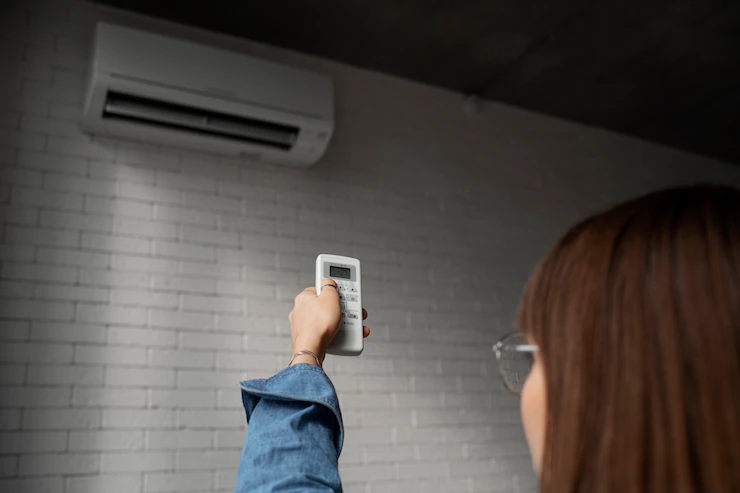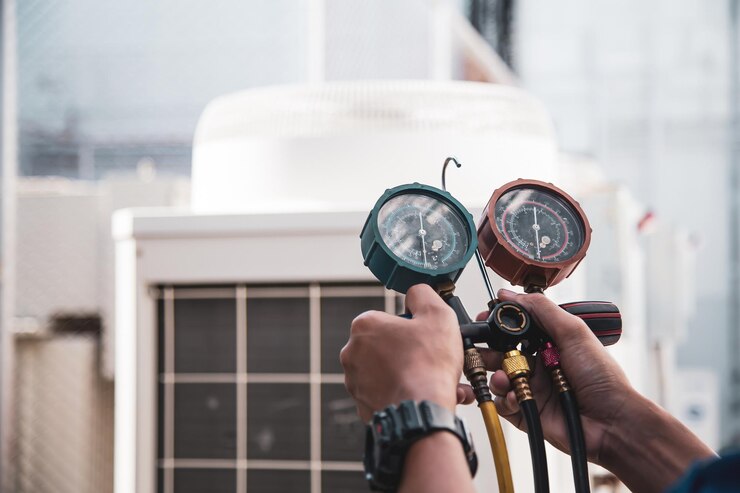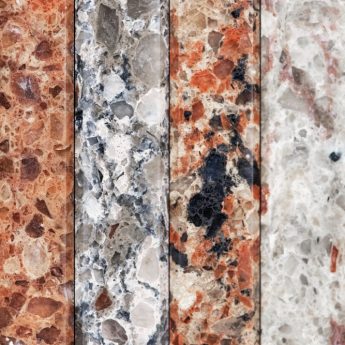AC Acting Up? Don’t Panic! Your Troubleshooting Guide To Mitigate The Air Conditioning Problems

Your home comfort level will decline fast in extreme weather without a properly working HVAC unit. Though the air conditioner issues are the last thing anyone would wish to hear, it is unavoidable even with the best-maintained units.
AC requires regular maintenance, replacements, and repairs like any other mechanical equipment. Collaborating with Mister Quik Home Services or other company near you offering the same service, ensures timely unit maintenance, guaranteeing efficient and more extended service.
In the following, we are going to discuss common air conditioning problems that you may face in the future. Read on to know more!
Top Side Effects Of Air Conditioning Problems On Health That You Must Know!

Here are the top air conditioning problems that you must stay aware of! Read on…
1. Obstructed Units
Regularly inspect inside and outside the AC to check for any obstruction signs around the unit. Look for debris around the AC unit’s branches, twigs, leaves, or dirt. These items can block or obstruct your unit’s airflow.
A unit that does not get sufficient air works harder than usual for optimal output. This may lead to overheating of the unit, which requires frequent repairs or professional maintenance by an expert. Remove any obstructions around the AC components to ensure the unit works smoothly.
2. Dirty Air Conditioner Filter
A dirty air conditioner filter is one of the most common issues. On average, you will need to change the AC filter once every three months.
However, the frequency depends on specific factors. Consider changing the filters sooner if you live in a dusty area or during extreme seasons when the AC works harder. A large household with pets may need to change the filters monthly.
Check your air conditioner filter monthly to see if it needs changing. If you notice significant dirt and dust, switch the filter or clean it. Remember, this is the part that filters the air before you breathe.
If you do not change or clean the air filter, you begin to breathe in dust and dirt. You may also notice some cold or hot spots around your house. If the air at home becomes stuffy, your household may develop breathing issues, especially for people with conditions like asthma.
DIY experts may decide to change the filters themselves. If you do and the same issue persists, call in an expert.

AC requires regular maintenance, replacements, and repairs like any other mechanical equipment
3. Faulty Thermostat
Many people mistake a thermostat issue with the whole AC unit error. Components in the thermostat bend or become misaligned, which leads to the unit’s problems.
A low battery thermostat will also cause problems as the thermostat cannot signal the air conditioner to the Ac unit for temperature regulation.
As a result, you will experience a decline in the comfort level of your home. Replace your AC batteries regularly. Consider directing the air vents away from the air conditioner.
4. Water Leaks
AC units produce condensation and have drain pipes to ensure proper water drainage. Look for any water leak as it points to a cracked or clogged drain.
If dealing with a clog, pour a little bleach with hot water periodically down the pipe to help clear the drainpipe. The leak may result from a heat exchanger, evaporator drain pan, or collector box. In that case, consider calling a professional to avoid further damage.
5. Strange Noises
A squealing or screeching sound from your AC blower motor points to a faulty belt that may break or a motor bearing. If that is the problem, you can sort it by adding lubricant to the oil port.
On the other hand, clanging, rattling, banging, or thumping means a problem with the motor assembly or the blower. Call an AC professional if you hear any of the noises.
6. Refrigerant Leaks
Refrigerant is essential for cooling, but leaks can make your system inefficient and increase your energy bills. A refrigerant leak might be suspected when there is poor cooling, a hissing sound, or ice on the coils.
Unlike other repairs, refrigerant handling requires special equipment and expertise. Do not try DIY solutions because refrigerant leaks are also harmful to the environment and your health.
Call an expert to diagnose and fix the problem. They will recharge the system and ensure it works efficiently.
7. Frozen Evaporator Coils
Evaporator coils absorb heat, but they may freeze up if airflow is restricted or if the refrigerant level is low. A frozen coil may result in uneven cooling or no cooling at all. If you see ice on the coils, turn off the AC and let them defrost.
However, frozen coils often signal underlying problems such as a dirty filter or a refrigerant leak. Call an expert to diagnose and fix the problem before it gets worse.
8. Electrical Problems
Electrical issues will make your AC fail or run inefficiently. Look out for common signs like frequent circuit trips, cool air not always being achieved, or units that don’t respond. Loose wires, corroded terminals, or faulty capacitors might cause this.
Since working with electrical components can be unsafe, these are best handled by professionals. Routine maintenance can actually prevent these kinds of issues from cropping up.
9. Sensor Issues
Air conditioners usually have a thermostat sensor located near the evaporator coil. If the sensor is either misaligned or damaged, the unit might cycle erratically or fail to maintain the desired temperature.
Check whether the sensor has been installed too close to or too far from the coil. Move it gently into position if access is possible. If the issue persists, a technician should be able to recalibrate or replace the sensor and restore operation as intended.
10. Poor Installation
Improper installation is one of the most common causes of AC inefficiency or frequent breakdowns. Misaligned ducts, undersized units, or incorrect refrigerant levels can lead to poor performance and increased wear and tear.
If your AC never worked as expected from the start, consult a professional to inspect the setup. They can identify and correct installation errors, ensuring optimal performance.
11. Tripped Circuit Breaker
Sometimes, your AC stops working because of a tripped circuit breaker. This occurs when the system draws in too much power, often due to running continuously or faulty components. Reset the breaker and try running the unit again.
If it trips repeatedly, call a professional to inspect for deeper electrical or mechanical issues causing the overload.
12. Blocked Vents
Closed or blocked vents can cause uneven airflow, making your AC work harder and less efficiently. Check all the vents in your house to make sure they’re open, and nothing is blocking them, like furniture, curtains, or debris.
Poor ventilation will not only cause uneven cooling but also strain the system. If airflow problems persist, an HVAC technician may need to evaluate and balance the system.
13. Older AC Unit
If your AC is more than 10–15 years old, it may lose efficiency or require frequent repairs causing air conditioning problems. Older units tend to consume more energy and may not cool as they should.
While regular maintenance can extend its life span, there comes a time when it becomes more cost-effective to replace the unit altogether. Consult an HVAC professional to assess whether it’s time for an upgrade. Modern systems are far more energy-efficient and reliable.
14. High Humidity
Your AC is designed to reduce indoor humidity, but if the system is underperforming, you may feel excess moisture or clammy air.
An oversized unit, dirty coils, or drainage issues can cause this. If the humidity remains, it could lead to mold growth and discomfort.
A professional can assess the system and recommend improvements, such as adding a dehumidifier or adjusting the settings on the unit.
15. Short Cycling
Short cycling is when your AC turns on and off frequently without completing a full cooling cycle. This wastes energy, puts excessive wear and tear on the system, and results in uneven cooling.
A dirty filter, issues with the refrigerant, or a thermostat error can cause it. If cleaning or adjusting the thermostat does not resolve the problem, call an expert to identify and correct the underlying cause.
16. Unresponsive AC Unit
If your AC doesn’t turn on at all, the problem could be as simple as a dead thermostat battery or as serious as a blown fuse.
First, check the power supply and the settings on the thermostat. If the unit doesn’t respond, it’s probably a more serious electrical or mechanical problem. A professional can diagnose the problem, inspect the system, and get it working quickly to mitigate the air conditioning problems.
17. Weak Airflow
Problems with the ductwork, a failing blower motor, or clogged air filters can cause weak airflow from your vents. If cleaning or replacing filters doesn’t fix the issue, inspect for visible blockages in the ducts.
For weak airflow that persists, have a professional inspect the blower motor and ducts to ensure that your system operates efficiently.
Conclusion
While you may opt to perform your air conditioner maintenance, some things require professional attention to keep the warranty. Address any anomaly in the AC as soon as you notice it to prevent a bigger problem.
Additionals:











Leave A Reply